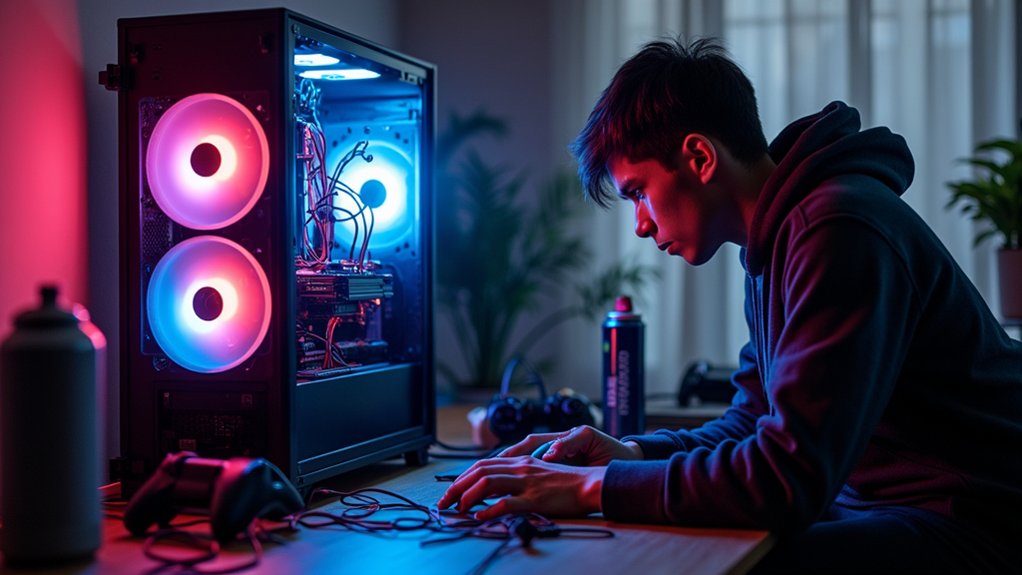
Best video cards and PC specs for 4K gaming
Keen to unlock true 4K gaming performance? Discover which video cards and PC specs deliver stunning visuals—your ultimate setup awaits just ahead.
Are you an avid gamer who loves pushing your PC to its limits with the latest games? You may be wondering if intense gaming sessions can actually harm your PC hardware. While it’s thrilling to dive into the newest titles, it’s essential to be aware that demanding games can put extra strain on your system. This strain might lead to unexpected issues, potentially impacting your PC’s performance. Ignoring early warning signs could not only shorten your PC’s lifespan but also cause sudden failures. Before risking your expensive gaming setup, here are some crucial tips to keep in mind.

By understanding how games can influence your PC hardware, you can take proactive measures to protect your investment. Keep your system cool and well-ventilated, regularly update your drivers, and monitor your hardware’s performance to ensure it can handle the demands of modern gaming. By following these steps, you can enjoy your gaming sessions without compromising the longevity of your PC hardware.
Playing intensive games can significantly impact your PC’s hardware. When you dive into demanding games, components like the graphics card, processor, and memory work overtime, increasing their speed, generating more heat, and consuming additional power.
These intense gaming sessions push your hardware to its limits, which can lead to increased wear and tear over time. Without proper cooling and regular maintenance, gaming can reduce your hardware’s lifespan and affect overall stability.
For gamers, understanding the impact of these intensive games on hardware is crucial. Ensuring your PC is equipped with adequate cooling solutions can help mitigate potential damage.
Regularly checking and maintaining your hardware can also extend its life, allowing you to enjoy your favorite games without interruption.
In the world of technology, gamers must be aware of how intensive games influence their system’s performance. By taking proactive steps, you can keep your hardware in top shape, ensuring a smooth gaming experience every time.
When diving into immersive gameplay, it’s crucial to recognize the signs of hardware stress.
These signs might include sudden frame drops, stuttering, unexpected shutdowns, or loud fan noise during intense gaming sessions. You may also notice higher temperatures, artifacting on the screen, or even system freezes.
These issues often indicate your hardware is struggling to cope with the game’s demands. Keep an eye out for these symptoms of hardware stress to ensure a smoother gaming experience.
Understanding how your system responds to intensive games can help you optimize performance and avoid potential damage.
Gaming can really push your PC to its limits, but don’t worry! There are several proactive steps you can take to protect your PC and ensure it runs smoothly.
First, always keep your drivers updated. This simple action can make a significant difference in performance and shield your PC from potential issues.
Next, remember to clean dust from your PC fans regularly. This helps prevent overheating, which can be detrimental to your hardware. Additionally, it’s important to monitor system temperatures while gaming to avoid any unexpected glitches or shutdowns.
Using quality surge protectors is another crucial step to protect your PC. They help guard against sudden power surges that could damage your hardware.
Also, avoid overclocking your PC unless you have proper cooling systems in place, as it can lead to overheating and long-term damage.
Close unnecessary background apps to free up resources for your gaming sessions, ensuring a smoother experience.
Regularly check for firmware updates, as they can improve performance and fix potential vulnerabilities.
Lastly, consider using FPS limits. By capping the frames per second, you can reduce unnecessary strain on your PC, prolonging its lifespan and maintaining optimal performance.
If you’re diving into intensive games, it’s crucial to keep a close eye on your PC’s health. Games can sometimes cause PC hardware problems, so watch for signs of overheating or performance drops, and never ignore those warning signals. By regularly cleaning your fans, updating your drivers, and monitoring your system’s temperatures, you’ll shield your hardware from potential issues and ensure your gaming sessions remain smooth. Remember, a little maintenance can prevent PC hardware problems—so take care of your PC, and it’ll enhance your gaming experience. Keep these tips in mind, and you’ll enjoy a seamless gaming journey.

Keen to unlock true 4K gaming performance? Discover which video cards and PC specs deliver stunning visuals—your ultimate setup awaits just ahead.

Before buying a new video card, discover the crucial steps to ensure compatibility with your motherboard—one mistake could cost you.

On the fence about upgrading your gaming laptop's graphics card? Discover what's truly possible before you make your next move.

Considering a hardware upgrade? Check out which PC brands make swapping components a breeze—and discover the standout choice you might not expect.

Why does hardware form the backbone of every computer system, impacting everything from speed to security? Discover what makes it truly indispensable.

Learn how turning off hardware acceleration could solve your gaming glitches—discover if this simple fix is what your setup needs next.